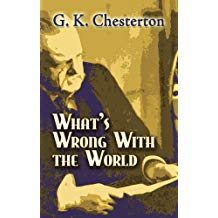What’s Wrong With The World
By G. K. Chesterton
This mature and enjoyable read, filled with theoretical and practical content, concisely explains the various problems arising from our society. The topics become progressively more interesting as the book delves into its five sections: “The Homelessness of Man,” “Imperialism: Or the Mistake About Man,” “Feminism: or the Mistake About Woman,” “Education: Or the Mistake About The Child” and “The Home of Man.”
Beginning with the curious and somewhat comical “Dedication”, this book captures the attention of those who wish to consider intellectual and political subjects, without the tedium of reading extensive chapters devoid of creativity or relevancy. This book is applicable to all who notice defects in our society and seek to understand what must be done to change, not only a universal mindset, but an individual narrowness of vision.
If at once Chesterton’s analysis of ‘the social cure’ takes some effort to comprehend, read on and you will find his poignant arguments are tempered by witty analogies and comparisons. Chesterton illustrates the backward thinking of our society where we often find, “some men are aiming at cures which other men would regard as worse maladies.” He explains how finding the disease will not lead to a cure. “What is wrong,” he states, “is that we do not ask what is right.” Many solutions lie not in the future, but in the past. People are afraid of the past, bored of the present and they “gape hungrily” for new and modern ideas in their future. We forget that “tomorrow is... mirrored only in the shining shield of yesterday.”
Without direct affirmation, this book revolves quietly and subtly around the observation that Christianity (The Catholic Church) is the epitome of common sense. Whatever the world lacks in ideals is not found lacking in the Catholic Church. “The Christian ideal,” Chesterton says, “has not been tried and found wanting. It has been found difficult and left untried.” Simply for the reason something has not been achieved in its entirety, does not make that thing a failure in itself. “Men have not got tired of Christianity; they have never found enough Christianity to get tired of.” The world appears to dislike the limitations of Christianity, however, in many aspects of life, “The excitement is to get the most out of given conditions.”
An intriguing aspect of the author’s style is his occasional introduction of fictional characters, in order that the readers may visualize a concept. “The Homelessness of Jones” and “The History of Hudge and Gudge” are notable chapters for understanding, from these characters, the shortsightedness of man. They illustrate how man is convinced, through socialism, that he must sacrifice what he desires to get what he is told he desires. He initially believes that half of something is better than nothing, but after a while he is convinced that none at all is better than even half. He thinks his only options are either something bad or something worse. The mistake is made when we do not begin with the ideal but instead with what will only pacify us. “Socialism may be the world’s deliverance but it is not the world’s desire.”
